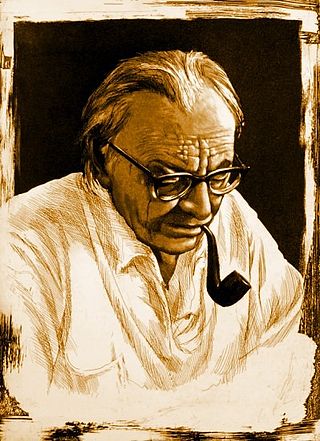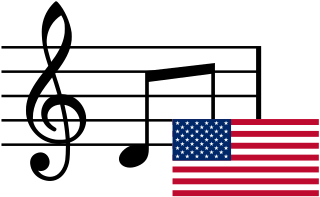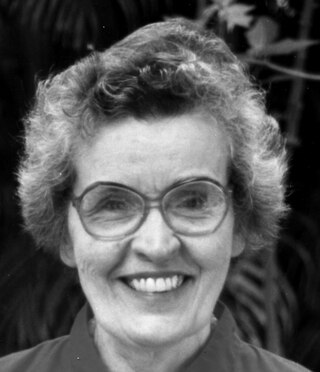
The xylophone is a musical instrument in the percussion family that consists of wooden bars struck by mallets. Like the glockenspiel, the xylophone essentially consists of a set of tuned wooden keys arranged in the fashion of the keyboard of a piano. Each bar is an idiophone tuned to a pitch of a musical scale, whether pentatonic or heptatonic in the case of many African and Asian instruments, diatonic in many western children's instruments, or chromatic for orchestral use.

Carl Heinrich Maria Orff was a German composer and music educator, who composed the cantata Carmina Burana (1937). The concepts of his Schulwerk were influential for children's music education.

Antigonae (Antigone), written by Carl Orff, was first presented on 9 August 1949 under the direction of Ferenc Fricsay in the Felsenreitschule, Salzburg, Austria, as part of the Salzburg Festival. Antigonae is in Orff's words a "musical setting" for the Greek tragedy of the same name by Sophocles. However, it functions as an opera.
Trudi Le Caine, CM was an arts patron involved with local and national arts initiatives in Ottawa, Ontario, Canada.
The Orff Schulwerk, or simply the Orff Approach, is a developmental approach used in music education. It combines music, movement, drama, and speech into lessons that are similar to a child's world of play. It was developed by the German composer Carl Orff (1895–1982) and colleague Gunild Keetman during the 1920s. Orff worked until the end of his life to continue the development and spread of his teaching method.

Music education is a field of practice in which educators are trained for careers as elementary or secondary music teachers, school or music conservatory ensemble directors. Music education is also a research area in which scholars do original research on ways of teaching and learning music. Music education scholars publish their findings in peer-reviewed journals, and teach undergraduate and graduate education students at university education or music schools, who are training to become music teachers.
The German educator Gunild Keetman was the primary originator of the approach to teaching music known as Orff Schulwerk. Keetman was responsible for most of the actual teaching that was done in the early stages of the movement, perhaps most prominently as the teacher for the radio and television broadcasts that popularized the Schulwerk throughout Germany in the 1950s.
Bloomingdale School of Music (BSM) is a non-profit community music school on the Upper West Side of New York City, in the neighborhood historically known as the Bloomingdale District. It is housed in a five-story, 102-year-old brownstone and was founded in 1964, by David D. Greer, organist and choirmaster of the West End Presbyterian Church. According to its website, BSM's mission is to "provide access to high-quality music education to anyone who seeks it, regardless of economic status, ability level, ethnicity, or religious affiliation."

Music education in the United States is implemented in many schools as a form of modern-day teaching. Music education is a field of study that focuses on the teaching and application of music in the classroom. As this addition to the curriculum progresses, the effects and implications to this course of study are being widely debated, especially the factors pertaining to. Researchers are able to follow its progression from its earliest known application within the field of academics.
Musica poetica is a theory of music in 16th–17th Century Germany, developing "figures" by analogy with rhetoric.
Gassenhauer nach Hans Neusiedler (1536), commonly known as Gassenhauer, is a short piece from Orff Schulwerk, developed during the 1920's by Carl Orff with long-time collaborator Gunild Keetman. As the full title indicates, it is an arrangement of a much older work by the lutenist Hans Neusidler from 1536. It is credited to Keetman on a 1995 release of the Schulwerk. As with many other pieces from the Schulwerk, it has been used multiple times on television, radio, music and in films, including the films Badlands (1973), True Romance (1993), Ratcatcher (1999), Finding Forrester (2000), Monster (2003), Michael Moore's Capitalism: A Love Story (2009), Priscilla (2023),The Simpsons' 22nd-season episode "The Scorpion's Tale" (2011), Friend of the World (2020), The Simpsons' 33rd-season episode "Mothers and Other Strangers" (2021) and Mad God (2021). The piece was used as the theme music for an afternoon radio program also titled Gassenhauer on the classical music station WCLV in Cleveland, Ohio, in the 1970s.

Simply Music is a music education organization licensing teachers at over 700 locations in twelve countries and serving an online self-study student community in 128 countries. Australian music educator Neil Moore founded it on the core belief that all humans are naturally musical. Simply Music offers programs for students from birth through old age, with the stated goal that "students acquire and retain music as a lifelong companion." Simply Music patterns its approach after primary language acquisition, where speaking comes first. In this it shares some philosophical ground with other developmental approaches like Kodály, Orff Schulwerk, and the Suzuki Method.
Keith Warren Bissell was a Canadian composer, conductor, and music educator. He was particularly known for his choral music, which often implemented elements of Canadian folk music. A passionate educator, he was a pupil of Carl Orff and was influential in popularizing the Orff Schulwerk methodology within North America. From 1957 to 1958 he was President of the Ontario Music Educators' Association. He was conductor and artistic director of the National Youth Orchestra of Canada in 1970–1971. He also was vice-president of the Canadian Music Council for several years and president of the Canadian Music Centre from 1975 to 1977.
Maria de Lourdes Martins was a Portuguese pianist and composer.

André de Quadros is a conductor, ethnomusicologist, music educator, and human rights activist.
The American Orff-Schulwerk Association (AOSA) is an organization of American music educators dedicated to utilizing, advancing and preserving Orff-Schulwerk, a developmental learning approach to music education which was created by composer Carl Orff and his colleague Gunild Keetman. It is an affiliate of the National Association for Music Education, the National Music Council, and the Orff-Schulwerk Forum in Salzburg, Austria. With approximately 4,500 members, it is one of the larger professional organizations for music educators in the United States.

Isabel McNeill Carley was a published writer, editor, composer and music teacher. She is considered one of the leaders of the Orff Schulwerk when it began to take hold in the United States in the 1960s. As a co-founder of the American Orff-Schulwerk Association (AOSA), Carley contributed greatly to the organization's beginnings, serving as a board member and magazine editor. Carley devoted much of her life to musical instruction, publishing a series of books titled Recorder Improvisation and Technique.
Margaret Murray MBE, was a British music educator and musician. Together with Gunild Keetman, she produced a "seminal" English-language version of Carl Orff's Orff-Schulwerk in 1957.
Tossi Aaron was an American folk singer, folk dancer, author, educator, and folk historian. She is known for her early-1960s recordings of secular and Jewish folk music, with a repertoire including blues, early American songs, and British and Scottish ballads in addition to folk songs in Yiddish and Hebrew. Following her recording and performing career she became a prominent music and arts educator.
Gertrud Orff was one of the first German music therapists. She developed Orff Music Therapy and, from 1939 to 1953, was the second wife and collaborator of the composer Carl Orff.







